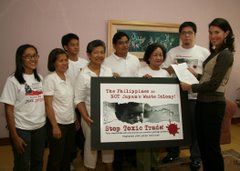 Photo by Marnie Dolera/GAIA.
Photo by Marnie Dolera/GAIA.Champion the Interest of Filipinos!
Calls for Senators to Junk JPEPA Resume
November 6, 2007. Manila, Philippines. A day after the Senate opened its doors for business from a three-week recess, representatives of the multi-sectoral civil society group Magkaisa Junk JPEPA Coalition (MJJC) were back at the Senate gates renewing their call for the Senators to junk the controversial Japan-Philippines Economic Partnership Agreement (JPEPA).
Nine members of MJJC were dressed in black and were each holding a picture of a faceless individual with a question mark on it representing the nine members of the Philippine Senate needed to reject the treaty. Flanked by representatives of the different sectors that would be most affected by the JPEPA, the MJJC representatives waved their banner with the challenge “Junk JPEPA 5-0: Who will champion the Filipinos?”
“In all five senate hearings, the Philippine and Japanese governments and the business sector have failed to convince the Senate on the merits of the JPEPA,” stated Ms. Beau Baconguis, Toxics Campaigner for Greenpeace Southeast Asia -- Philippines, a member of the MJJC. “They have not debunked the arguments on toxic trade. They could not even provide concrete evidence of economic and investment benefits to sway the Senators who were present at the hearing”, stated Baconguis.
“The Senators saw that there is nothing in JPEPA that will benefit the Filipinos,” continued Ms. Baconguis. “Now they have all the reasons to reject JPEPA. We urge the Senators to step up to the plate and be the Filipinos’ champions against JPEPA.”
For over a month, the Senate Committee on Foreign Relations -- chaired by Sen. Miriam Defensor-Santiago and co-chaired by Sen. Mar Roxas, head of the Committee on Trade -- conducted several hearings on the JPEPA. The hearings were focused on five initial issues: the economic impacts of JPEPA, investments, the environment, the movement of natural persons, and the constitutionality of the treaty. At all five hearings the Senators present expressed their dismay and frustration over the government’s ineptitude in proving the alleged economic and social benefits that the JPEPA will bring.
In stark contrast, the oppositors to the JPEPA not only exposed the misleading numbers and information provided by the government panel led by DTI Undersecretary Tomas Aquino, they also showed how the Philippine negotiating panel failed to obtain the best possible deal in comparison to the agreements Japan signed with Singapore, Thailand, Malaysia and Indonesia.
“For the past couple of weeks, paid ads have been littering newspapers promoting the misleading statements put forward by the proponents of JPEPA, which the Senators themselves did not believe!” exclaimed Mr. Edwin Bustillos, Deputy Secretary General of the Alliance for Progressive Labor, member of the MJJC.
The MJJC was also able to demonstrate the width and breadth of the sectors opposing the treaty. The Philippine Nurses Association, the supposed main beneficiary of the JPEPA, belied the rosy claims of the government, saying that the Philippine negotiating panel did not adequately protect the interests of our nurses who are the best in the world. The overseas recruiters also considered the JPEPA a bad deal citing the language requirement for Filipinos who wish to work in Japan as a main hindrance.
Automotive workers from Japanese companies such as Toyota and Honda also raised their voices against JPEPA because of the threat of de-industrialization of the Philippine auto industry. They also rallied against the negative safety and environmental impacts of the tsunami of Japanese second-hand cars flooding the local market. Local and international environmental groups further joined the opposition line-up, citing factual data of Japan dumping toxic wastes in Asian countries in the guise of recyclables, and how Japan will likely do the same to the Philippines using the JPEPA.
The most stinging opposition voices against JPEPA, however, came from an international trade expert and from a distinguished member of the legal academe. Former chairman of the World Trade Organization appellate body and renowned international trade law expert, retired Philippine Supreme Court Justice Florentino P. Feliciano, and former dean of the UP College of Law, Professor Merlin Magallona, both did not mince words in declaring that the JPEPA violates the Philippine Constitution on various grounds. Speaking to the press after the testimony of Feliciano and Magallona, Senator Santiago conceded that “if we go by the objective analysis of these independent experts, the JPEPA is dead.”
Two more hearings are scheduled for the JPEPA, one focusing on agriculture and the other on trade. The hearings are expected to be finished early November. A Senate vote on the JPEPA, to ratify or reject, may follow immediately thereafter. “Now that the hearings will soon come to a close, Filipinos are asking the questions, who will defend us against JPEPA? Who will be our Champion?” stated Mr. Bustillos. “We have faith in the independence and wisdom of the Senate, and believe that they will see one reasonable and practical outcome - the non-ratification of the atrocious treaty called JPEPA.”
- End -







No comments:
Post a Comment